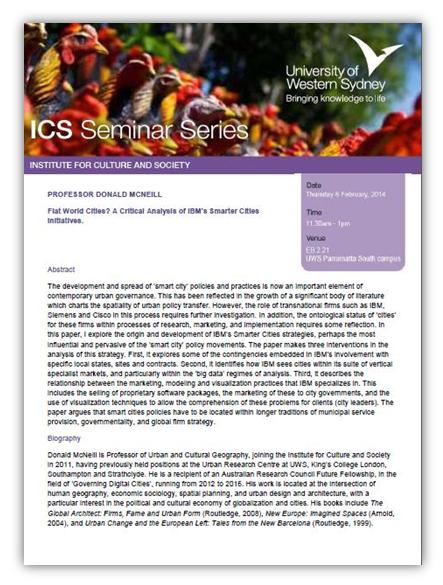ICS Seminar Series - Hermann Ruiz
Date: Thursday 22 May, 2014
Time: 11.30am - 1pm
Venue: EB.2.21
Hermann Ruiz
'Conjuring Up the Past: Lessons from Village Spiritual Practices for Transitional Justice Theory'
Abstract
What does transitional justice do? More concretely, what is the universe of possibilities of transitional justice? To answer that question I studied literature on transitional justice to locate its core elements after experiencing the complex application of its policies in the Colombian peace process with paramilitaries. I realised, then, that the most influent scholars in this field avoid making substantive definitions, preferring descriptive conceptualisations aimed to highlight the pragmatic orientation of transitional justice as public policy. I concluded that the universe of possibilities opened up by transitional justice is inspired (and constrained) by a modern teleological narrative of liberal progress which supposes that the democratic rule of law and market economy are variables enough to bring about a significant social transformation from war to peace. In the spirit of questioning this narrative, I decided to explore everyday experiences of relationships with the dead (or haunting) as a vehicle to insert elements of time complexity into future-oriented narratives of modern progress. Linking my interest with authoritarian regimes and terror with my curiosity for haunting spirits of the dead, I went to Java, Indonesia. I observed, and hope learned from, the slametan and the jathilan, two spiritual practices performed to relate to the local spiritual ecology. The stage two strategies to relate to the dead. In the slametans I attended, the main aim of the practice was to acknowledge and honour them; in the jathilans, its purpose was to conjure the spirits to unexpectedly open up questioning the audience and to invite a reflection on new possibilities for the future. Similarly with these two spiritual practices, transitional justice promotes the reproduction of narratives of social order while also opening up meaningful engagements with the past that, if allowed, may invite significant reflections about the future. I argue that the latter experience represents what I defend is the normative landmark of transitional justice: to conjure up the past to open up possibilities of genuine transformative political imagination.
Biography
Hermann Ruiz is a political scientist and anthropologist. He did his undergraduate and masters studies in Colombia, where he is originally from. He has done research on indigenous rights in Colombia and Latin America, and about forced displacement and torture in Colombia in the context of the peace agreements with paramilitaries. His current PhD research is an analysis of the theoretical foundations of transitional justice as a set of public policies designed to facilitate transitions from war to peace based on ideas of accountability, rule of law and economic development. Hermann uses ethnographic techniques as a method to learn from and inform concept creation with lively experiences of some of the core concepts of his research. In this case, he travelled to Indonesia and spent a few months in Yogyakarta to observe different practices to relate to the spirits of the dead as a way to re-imagine the paradoxical relationship transitional justice stabilises with the past.





